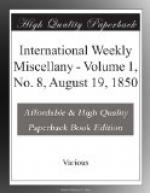In this respect, the mass and the aristocracy, the serfs and their masters, are as alike as twins. The noble is quite as coarse as the peasant. In Poland this is quite otherwise. The peasant may be called a rough creature, but the noble is almost always a man of refinement, lacking indeed almost always in scientific information, but never in the culture of a man of the world. The reason of this is, that his active, impetuous soul finds constant occasion for maintaining familiarity with the world around him, and really needs to keep up a good understanding with it. The Russians know no such want.
Even in St. Petersburg the German was long much more successful than the native theater, though the number of Russians there is seventeen times larger than that of the Germans. The Russians who there visit the theater are the richest and most prominent members of the aristocracy. They however consider the drama as simply a thing of fashion. Hence results the curious fact that it is thought a matter of good taste to be present at the beginning but not to wait for the end of a piece. It has happened that long before the performance was over the house was perfectly empty, everyone following the fashion, in order not to seem deficient in public manners. If there is ever a great attraction at the theater, it is not the play, but some splendid show. The Russian lady, in studying the coiffure or the trailing-robe of an actress, forgets entirely her part in this piece, if indeed she has ever had an adequate conception of it. For this reason, at St. Petersburg and Moscow the ballet is esteemed infinitely higher than the best drama; and if the management should have the command of the Emperor to engage rope-dancers and athletes, circus-riders and men-apes, the majority of Russians would be of opinion that the theater had gained the last point of perfection. This was the case in Warsaw several years ago, when the circus company of Tourniare was there. The theaters gave their best and most popular pieces, in order to guard against too great a diminution of their receipts. The Poles patriotically gave the preference for the drama, but the Russians were steady adorers of Madame Tourniare and her horse. In truth, the lady enjoyed the favor of Prince Paskiewich. General O—— boasted that during the eleven months that the circus staid he was not absent from a single performance. The Polish Count Ledochowski, on the other hand, said that he had been there but once when he went with his children, and saw nothing of the performance, because he read Schiller’s William Tell every moment. This was Polish opposition to Russian favoritism, but it also affords an indication of the national peculiarities of the two races.




